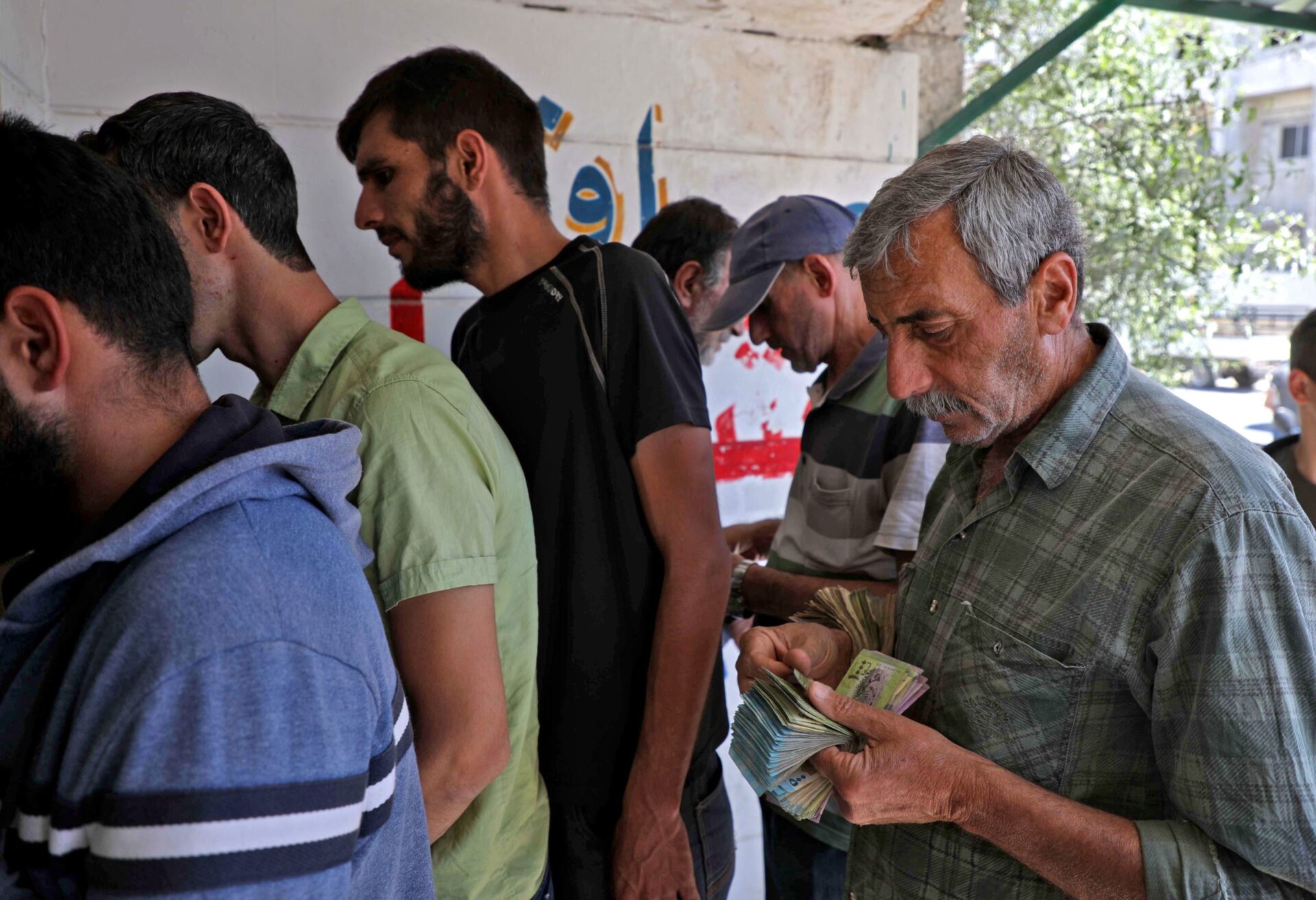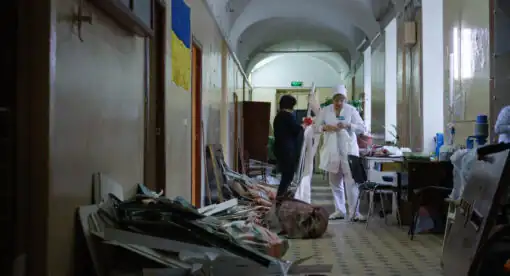The U.S. Caesar Syria Civilian Protection Act went into effect on June 17, with a first round of 39 Treasury and State Department designations. The United States vowed to continue a “sustained campaign of economic and political pressure to deny the Assad regime revenue.” The “Caesar Act” sanctions will undoubtedly accelerate the demise of Syria’s faltering economy. However, the United States could be inadvertently pushing Syria further into Iran and Russia’s sphere of influence. Both Moscow and Tehran will seek to exploit Damascus’ financial ruin to secure more resources and control.
By themselves, the Caesar sanctions are unlikely to force President Bashar al-Assad into a compromise; almost nine years of constant sanctions on the economy and the ruling elite have borne little fruit in that regard. But Syria has been mired in deep financial troubles throughout most of 2020, its economy is in turmoil, rare anti-government protests have broken out in Suweyda, and the Syrian pound is declining steadily but rapidly. With the general situation in Syria teetering on the brink, the sanctions will have an amplified effect.
Assad Loyalist Reactions to the Caesar Act
Officially, the Assad government has portrayed the Caesar Act as a last-chance U.S. attempt to bring Syria to the negotiating table. The rhetoric in Syria has been typically fierce. A statement from the Ministry of Foreign Affairs pulled no punches: “The U.S. administration that is chasing its citizens in the various streets of its states, killing people in cold blood, and practicing the most heinous forms of racial discrimination is the least entitled to rant about human rights.”
The increased pressure will likely exacerbate the siege mentality that has prevailed since the early stages of the international isolation imposed on the country. In preparation for the sanctions, the Syrian political establishment has ratcheted up its criticism of U.S. policy rather than identifying the possible ways to avoid further sanctions. Hardline Syrian People’s Assembly member Muhannad al-Haj Ali called the Caesar Act “evidence of America’s failure in Syria.” Meanwhile, influential Aleppo-based Assembly member Fares Shehabi warned of how the United States wanted to “destroy the country and loot it, and not anything else.”
The state-sponsored narrative has done little to allay the wider fear of what the sanctions will do to Syria’s deteriorating economic situation. In government-held areas, loyalists have been scrambling to the internet to find out what these new measures would mean for them and the country that has been on a knife edge in recent months. Syrian writer Khalil al-Saadi depicted the increasing fears:
The economic crash has already started, travel plans for young people to leave the country will begin after the COVID-19 pandemic passes, medium and small companies are falling apart while poverty has just continued to get worse. The corruption in the country is evident, and our esteemed government has yet to take urgent measures.
Al-Assad’s main answer to the Caesar sanctions has been the June 11 sacking of Prime Minister Imad Khamis, a much-maligned figure and symbol of the endemic corruption in the country. Days before Khamis was booted out, he had to claimed that “Syria needed $20 billion between the years 2017 and 2020 to maintain stability in the Syrian pound,” proving the immense financial difficulties Damascus is facing in day-to-day currency stabilization. To put that into context, Syria’s 2019 budget was just $9 billion.
While authorities have made some piecemeal decisions to contain potential fallout from the Caesar Act, no wider, long-term strategy to carry the country through this financial storm has been set out. The Central Bank of Syria raised the official exchange rate of the U.S. dollar to 1,265 Syrian pounds from 704, further devaluing the currency, although that rate remains at least 1,000 short of the unofficial exchange rate of 2,650 to the dollar.
Additional steps such as the formation of “al-Areen” (The Den), a new charity, sought to appease some of the poorer segments of the country and the families of fallen soldiers. An announcement to distribute 25,000 Syrian pounds to wounded soldiers in addition to a 100 percent salary raise for disability injuries of 70% among the auxiliary forces aimed to pacify some of the government’s increasingly discontent support base.
While the sanctions’ potential impact has been the subject of much debate in Western policy circles, within Syria discussions have focused on reducing the long-term effects of the sanctions by creating more economic self-reliance. The Syrian Minister of Economy Samer Al-Khalil told the pro-regime al-Watan newspaper, “Self-reliance, in addition to strengthening the role of the private sector, is the best way to confront the Caesar Law.”
The Caesar Act has effectively stopped the recent Gulf-Syria economic rapprochement led by the United Arab Emirates. Unless some unlikely political maneuvering between Damascus and Washington takes place to allow Gulf countries more freedom to re-enter the Syrian theater, Washington’s drawn-out campaign of maximum economic pressure would end most possibilities of financial support to al-Assad. Yet, as Damascus continues struggling with an economic breakdown, all eyes will be on Russia and Iran to see if they can provide some short-term financial reprieve.
Russia and Iran Unlikely to Provide a Bailout
There is an expression in Damascus that describes someone who is miserly: “Every time he opens his wallet, his knees shiver.” That might be an apt metaphor for the current status of Iran and Russia, Syria’s two patrons. Notwithstanding the many differences and rivalries between Russia and Iran on a granular Syrian level, Moscow and Tehran – which are both under sanctions and facing their own domestic economic pressures – would want a return on their longstanding investment in Syria as opposed to being drawn into more economic assistance. Both countries will be reluctant to put more money and resources into a collapsing economy without significant concessions in resources and installations. In fact, Russian President Vladimir Putin requested last month that his ministers begin negotiating with Syria in order to secure more military installations. One social media user posted, “The U.S. Caesar Law is sponsored by the Russian Caesar.”
Russia has a lease on the strategic Khmeimim air base in Latakia on the Mediterranean that runs up to 2066, and Moscow negotiated a long-term contract for Syria’s Tartus port for 49 years in 2017. Reaching its tentacles into Syria’s center or Aleppo, for instance, would give Russia a greater strategic depth – especially in Syria’s north, considering the Russians’ historical rivalry with Turkey. Russia has been eyeing crucial areas and installations in Syria for some time, including bases in Eastern Homs and the Hama military airport. The weakened Syrian economy could give Russia a prime opportunity to expand from its traditional areas of influence on the Syrian coast and have permanent bases elsewhere in the country.
With the Caesar sanctions in place, Damascus is likely to want to cooperate with the Russians and Iranians. Eyas Saker, a National Defense Forces commander, wrote that Syria would be wise to foster further ties with the Russians, saying, “With the Caesar law, either we die of starvation or we have a smart policy.” He added that Russia “is taking positive practical steps to help Syria more than others.”
On Moscow’s side, Russian Deputy Foreign Minister Sergei Ryabkov stated that “The sanctions (Caesar Act) are illegal and no one can prevent Moscow and Damascus from cooperating in all fields.” He added that Moscow “is ready to engage immediately with an expanded dialogue with the United States on all issues concerning the situation in Syria.”
The Iranian Foreign Ministry was also quick to criticize the new sanctions, stating that they are “a violation of international law and human rights, and Iran will continue to strengthen its economic relations with Syria despite this measure.” Hassan Danaei-Fard, head of the Headquarters for the Development of Economic Relations with Iraq and Syria, paid a visit to Damascus that was timed to coincide with the Caesar Act implementation.
Although Iran is expected to show a strong level of political solidarity with Syria, it remains to be seen just how that could translate into genuine economic support. Iran faces a dire economic predicament itself, which could hinder any efforts to save Syria’s economy.
If the current situation continues, it could set up an Iranian-Russian gold rush to buy up what remains of Syria’s sellable assets for a significant but temporary cash injection. Despite the economic pressures on Moscow and Tehran, helping to stabilize Syria in the short-term for more control and influence would outweigh the costs.
Unprecedented Hardship for Syria’s Economy
The sanctions’ early effects have been seen both on the psychological level and on pharmacy shelves. Medicine shortages have been increasingly worrying, with around 400 types of medicine absent. This has been linked to problems in the supply chain and the factories, many of which have run out of cash because they have had to purchase raw materials at hyper-inflated prices and sell products at lower, government-approved rates.
A growing sentiment in Damascus is that the country would have to fight the sanctions with a defiant, “keep calm and carry on” attitude. Demonstrations in Homs and Tartus after the Caesar Act’s implementation were aimed at rejecting and condemning the “American sanctions and coercive measures imposed on Syria.” Pro-regime media have called the sanctions the main source of Syria’s misfortunes. Dr. Haitham Al-Tas, Dean of the Faculty of Law at the University of Damascus, considered that the “Western unilateral coercive measures against Syria seek to achieve what Washington failed to achieve through the war, which is transforming Syria into a country affiliated with the United States politically, economically and militarily.” Adib Mayaleh, the former governor of the Central Bank of Syria, said that “there is great media intimidation with regards to the Caesar law,” in reference to the psychological impact of the sanctions on Damascus.
The real impact of the sanctions will not be apparent for some time, but the rest of this year promises to be an unprecedented period of both economic and socio-political desperation. And taking into account the fact that Syria’s industrial and economic infrastructure is devastated by the fighting and the growing financial strains in Lebanon, there seem to be only two exit points from the current crisis. Damascus can accept total subordination to Russia and Iran by seeking greater emergency economic assistance. Alternatively, it can negotiate with the United States to lift the pressure. Both are seemingly difficult choices for the Syrian regime.
Danny Makki is a non-resident scholar at the Middle East Institute covering the internal dynamics of the conflict in Syria. Makki specializes in Syria’s relations with Russia and Iran. He Tweets at @Dannymakkisyria.
The views expressed in this article are those of the author and not an official policy or position of the Newlines Institute.






